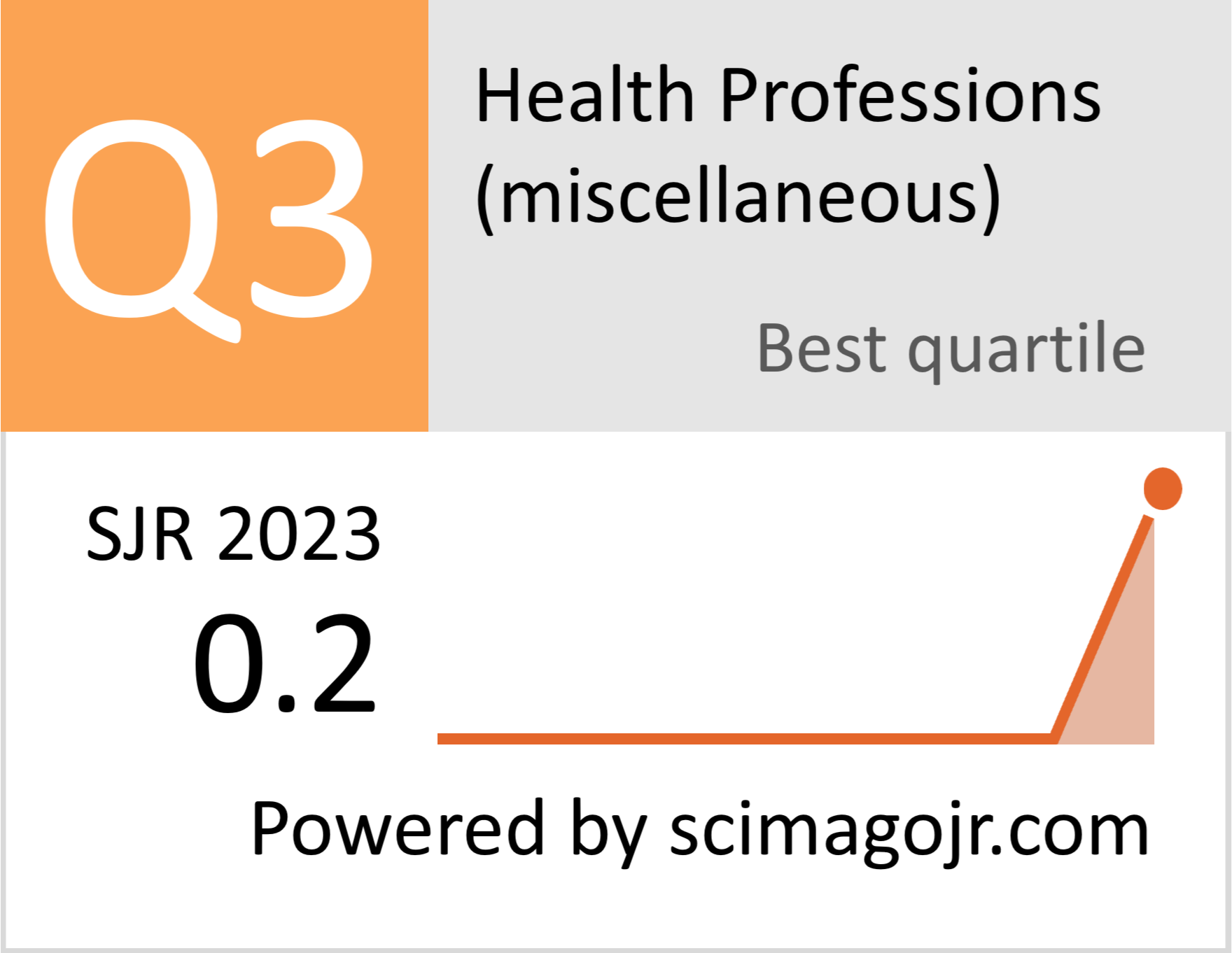Borderline Personality Disorder, Early Adverse Experiences, and Cognitive Biases: A Systematic Review
Trastorno límite de la personalidad (TLP), experiencias adversas tempranas y sesgos cognitivos: una revisión sistemática

This work is licensed under a Creative Commons Attribution-NonCommercial-NoDerivatives 4.0 International License.
Show authors biography
Introduction. Current research and articles on early adversity and cognitive biases in patients with borderline personality disorder (BPD) demonstrate the relationship between these variables and the severity of the clinical symptoms of this disorder.
Objective. The aim was to systematically review the evidence of the relationship between early adversity, cognitive biases, and exacerbation of symptoms of borderline personality disorder. The research gap concerns the particular type of early adversity and its relationship with the specific type of cognitive biases and the course of BPD in patients with this diagnosis.
Methodology. We conducted a systematic literature review, and the Prisma statement version 2020 was used to report the evidence. The databases consulted were Scopus, Pubmed, Web of Science, and PsycInfo. Gray literature databases, such as Google Scholar, Open Gray, and WorldCat, were also included in the search.
Results. We included 13 articles in the study that met the criteria for originality, studied theme (early adversity, cognitive functioning, and borderline symptomatology), and target population (patients diagnosed with a personality disorder).
Conclusions. We found that while there is evidence that early adversity, in general, is a risk factor for BPD, further research is needed to understand the specific types of adversity that may be more strongly related to the development of BPD. In addition, although some studies have identified cognitive biases in individuals with BPD, little is known about how these biases develop and change over time or according to the stage of the patient's exposure to early adversity.
Article visits 3171 | PDF visits 1345
- Tintaya Condori P. Psicología y personalidad. Revista de Investigación Psicológica [Internet]. Junio de 2019;(21):115-34. Disponible en: https://tinyurl.com/2ks7bo5j
- American Psychiatric Association, editor. Guía de consulta de los criterios diagnósticos del DSM-5™ [Internet]. Arlington, VA: American Psychiatric Publishing; 2014. 438 p. Disponible en: https://tinyurl.com/y96wp9v4
- Marques S, Barrocas D, Rijo D. Intervenções Psicológicas na Perturbação Borderline da Personalidade: Uma Revisão das Terapias de Base Cognitivo-Comportamental. Acta Med Port [Internet]. 28 de abril de 2017;30(4):307-19. doi: https://doi.org/10.20344/amp.7469
- Oviedo GF, Gómez-Restrepo C, Rondón M, Borda Bohigas JP, Tamayo Martínez N. Tamizaje de rasgos de personalidad en población adulta colombiana. Encuesta Nacional de Salud Mental 2015. Revista Colombiana de Psiquiatría [Internet]. diciembre de 2016;45:127-34. doi: https://doi.org/10.1016/j.rcp.2016.08.002
- Asociación Nacional de Informadores de la Salud. Entre el 2 y el 8% de la población padece trastorno límite de la personalidad [Internet]. Disponible en: https://tinyurl.com/2lf6ddkq
- Israel Guzmán PF. Variables demográficas, clínicas y de preferencias asociadas con la disposición de los pacientes a reportar experiencias adversas tempranas durante la primera entrevista clínica [Internet] [Magíster en Psicología Clínica]. Pontificia Universidad Católica de Chile; 2019. Disponible en: https://tinyurl.com/2kl7msuz
- Felitti VJ, Williams SA. Long-Term Follow-Up and Analysis of More Than 100 Patients Who Each Lost More Than 100 Pounds. TPJ [Internet]. Septiembre de 1998;2(3):17-21. doi: https://doi.org/10.7812/TPP/98.932
- Arnow BA. Relationships Between Childhood Maltreatment, Adult Health and Psychiatric Outcomes, and Medical Utilization. J Clin Psychiatry [Internet]. 1 de agosto de 2004;65:10-5. Disponible en: https://www.psychiatrist.com/read-pdf/17355/
- Anda RF, Felitti VJ, Bremner JD, Walker JD, Whitfield Ch, Perry BD, et al. The Enduring Effects of Abuse and Related Adverse Experiences in Childhood: A Convergence of Evidence from Neurobiology and Epidemiology. Eur Arch Psychiatry Clin Neurosci [Internet]. Abril de 2006;256(3):174-86. doi: https://doi.org/10.1007/s00406-005-0624-4
- Villarreal MF, Wainsztein AE, Mercè RÁ, Goldberg X, Castro MN, Brusco LI, et al. Distinct Neural Processing of Acute Stress in Major Depression and Borderline Personality Disorder. Journal of Affective Disorders [Internet]. Mayo de 2021;286:123-33. doi: https://doi.org/10.1016/j.jad.2021.02.055
- Sereno Torres LC, Camelo Roa SM. Efecto de las experiencias adversas durante la niñez sobre la actividad electroencefalográfica en reposo. Psychol [Internet]. 31 de diciembre de 2020;14(2):81-94. doi: https://doi.org/10.21500/19002386.4888
- Torres-Salazar C, Moreta-Herrera R, Ramos-Ramírez M, López-Castro J. Sesgo cognitivo de optimismo y percepción de bienestar en una muestra de universitarios ecuatorianos. Rev colomb psicol [Internet]. 1 de enero de 2020;29(1):61-72. doi: https://doi.org/10.15446/.v29n1.75853
- Kahneman D. Two Systems in the Mind. Bulletin of the American Academy of Arts and Sciences [Internet]. 1 de enero de 2012;65(2):55-9. Disponible en: https://tinyurl.com/2oc28cj5
- Gigerenzer G, Czerlinski J, Martignon L. How Good are Fast and Frugal Heuristics? En: Shanteau J, Mellers BA, Schum DA, editores. Decision Science and Technology [Internet]. Boston: Springer; 1999. p. 81-103. doi: https://doi.org/10.1007/978-1-4615-5089-1_6
- Corral Rego L. Validación del cuestionario de sesgos cognitivos para la psicosis (CBQP): relación con sintomatología, insight y neurocognición [Internet]. Universitat Rovira i Virgili; 2019. Disponible en: https://dialnet.unirioja.es/servlet/tesis?codigo=267339
- Page MJ, McKenzie JE, Bossuyt PM, Boutron I, Hoffmann TC, Mulrow CD, et al. The PRISMA 2020 Statement: An Updated Guideline for Reporting Systematic Reviews. BMJ [Internet]. 29 de marzo de 2021;71. https://doi.org/10.1136/bmj.n71
- Arntz A, Dietzel R, Dreessen L. Assumptions in Borderline Personality Disorder: Specificity, Stability and Relationship with Etiological Factors. Behaviour Research and Therapy [Internet]. Junio de 1999;37(6):545-57. doi: https://doi.org/10.1016/S0005-7967(98)00152-1
- Savitz J, Van der Merwe L, Stein DJ, Solms M, Ramesar R. Genotype and Childhood Sexual Trauma Moderate Neurocognitive Performance: A Possible Role for Brain-Derived Neurotrophic Factor and Apolipoprotein E Variants. Biological Psychiatry [Internet]. Septiembre de 2007;62(5):391-9. doi: https://doi.org/10.1016/j.biopsych.2006.10.017
- Sieswerda S, Arntz A, Mertens I, Vertommen S. Hypervigilance in patients with borderline personality disorder: Specificity, automaticity, and predictors. Behaviour Research and Therapy [Internet]. Mayo de 2007;45(5):1011-24. doi: https://doi.org/10.1016/j.brat.2006.07.012
- Minzenberg MJ, Poole JH, Vinogradov S. A Neurocognitive Model of Borderline Personality Disorder: Effects of Childhood Sexual Abuse and Relationship to Adult Social Attachment Disturbance. Dev Psychopathol [Internet]. 2008;20(1):341-68. doi: https://doi.org/10.1017/S0954579408000163
- Thomsen MS, Ruocco AC, Carcone D, Mathiesen BB, Simonsen E. Neurocognitive Deficits in Borderline Personality Disorder: Associations With Childhood Trauma and Dimensions of Personality Psychopathology. Journal of Personality Disorders [Internet]. Agosto de 2017;31(4):503-21. doi: https://doi.org/10.1521/pedi_2016_30_265
- Duque-Alarcón X, Alcalá-Lozano R, González-Olvera JJ, Garza-Villarreal EA, Pellicer F. Effects of Childhood Maltreatment on Social Cognition and Brain Functional Connectivity in Borderline Personality Disorder Patients. Front Psychiatry [Internet]. 29 de marzo de 2019;10:156. doi: https://doi.org/10.3389/fpsyt.2019.00156
- Richard-Lepouriel H, Kung AL, Hasler R, Bellivier F, Prada P, Gard S, et al. Impulsivity and its Association with Childhood Trauma Experiences Across Bipolar Disorder, Attention Deficit Hyperactivity Disorder and Borderline Personality Disorder. Journal of Affective Disorders [Internet]. Febrero de 2019;244:33-41. doi: https://doi.org/10.1016/j.jad.2018.07.060
- Alafia J, Manjula M. Emotion Dysregulation and Early Trauma in Borderline Personality Disorder: An Exploratory Study. Indian Journal of Psychological Medicine [Internet]. Mayo de 2020;42(3):290-8. doi: https://doi.org/10.4103/ijpsym.ijpsym_512_18
- Hillmann K, Neukel C, Krauch M, Spohn A, Schnell K, Herpertz SC, et al. Cognitive and Affective Theory of Mind in Female Patients With Borderline Personality Disorder. Journal of Personality Disorders [Internet]. Octubre de 2021;35(5):672-90. doi: https://doi.org/10.1521/pedi_2020_34_490
- Peng W, Liu Z, Liu Q, Chu J, Zheng K, Wang J, et al. Insecure Attachment and Maladaptive Emotion Regulation Mediating the Relationship Between Childhood Trauma and Borderline Personality Features. Depression and Anxiety [Internet]. Enero de 2021;38(1):28-39. doi: https://doi.org/10.1002/da.23082
- Gica S, Kaplan B, Atar AT, Gulec MY, Gulec, H. Investigation of the Effects of Childhood Sexual Abuse on Disease Severity and Cognitive Functions in Borderline Personality Disorder. Dusunen Adam: The Journal of Psychiatry and Neurological Sciences. 2021; 34(2):141-50. doi: https://doi.org/10.14744/dajpns.2021.00132
- Jaworska-Andryszewska P, Rybakowski J. Higher Indexes of Childhood Trauma in Borderline Personality Disorder Compared with Bipolar Disorder. Psychiatr Pol [Internet]. 27 de febrero de 2022;56(1):7-18. doi: https://doi.org/10.12740/PP/140537
- Pérez Longares P. Revisión de los factores de riesgo que influyen en el trastorno límite de la personalidad [Internet] [Tesis]. 2021. Disponible en: https://riucv.ucv.es/handle/20.500.12466/1879
- Prittwitz Sanz CU. Evaluación, diagnóstico y tratamiento de un caso con trastorno límite de la personalidad [Internet] [Tesis de maestría]. 2022. Disponible en: http://titula.universidadeuropea.com/handle/20.500.12880/2343
- Herrera Huerta CA, Magallanes Cano EM, Soto Briseño AI, Orozco Zagal E, Camarena Robles E. Trastorno límite de la personalidad: funciones ejecutivas y severidad sintomática. Psicosomática y Psiquiatría [Internet]. 28 de abril de 2022;21. doi: https://doi.org/10.34810/PsicosomPsiquiatrnum210401
- McLaughlin KA, Weissman D, Bitrán D. Childhood Adversity and Neural Development: A Systematic Review. Annu Rev Dev Psychol [Internet]. 24 de diciembre de 2019;1(1):277-312. doi: https://doi.org/10.1146/annurev-devpsych-121318-084950
- Burgal Juanmartí F, Segura Bernal J, Fernández Puig V, Sánchez Matas M. Trastorno límite de la personalidad e inteligencia emocional en adolescentes institucionalizados. International Journal of Psychology and Psychological Therapy [Internet]. 2019;19(2):229-38. Disponible en: https://tinyurl.com/2fzlasnv
- Núñez Morales N, Sancho M, Granados Martínez B, Gibert Rahola J. Trastorno límite de la personalidad (TLP): características, etiología y tratamiento. Psiquiatría Biológica [Internet]. septiembre de 2019;26(3):85-98. doi: https://doi.org/10.1016/j.psiq.2019.10.001
- Downs, SH., & Black, N. The feasibility of creating a checklist for the assessment of the methodological quality both of randomised and non-randomised studies of health care interventions. Journal of epidemiology & community health, (1998). 52(6), 377-384. doi: http://dx.doi.org/10.1136/jech.52.6.377



